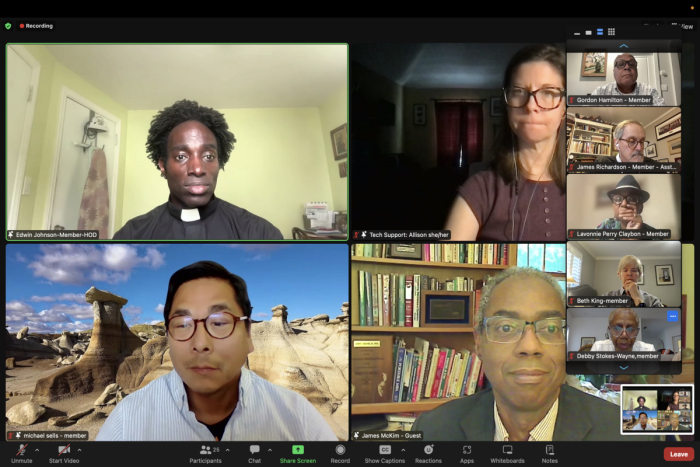
General Convention’s Racial Truth-Telling, Reckoning & Healing committees heard testimony on May 23 on three proposed resolutions: the commitment to reparations, increasing the number of people of color in church positions, and the establishment of model policies for anti-racism and racial reconciliation work. Photo: Screenshot
[Episcopal News Service] General Convention’s Racial Truth-Telling, Reckoning & Healing committees heard testimony on May 23 on three proposed resolutions: the commitment to reparations, increasing the number of people of color in church positions, and the establishment of model policies for anti-racism and racial reconciliation work.
Twenty-five people attended the online hearing of the House of Bishops’ and House of Deputies’ committees, which though distinct, typically meet and deliberate together. Once finalized, resolutions will advance to the 81st General Convention, to be held June 23-28 in Louisville, Kentucky.
The full list of resolutions can be found here.
Resolution A015, “Owning a Commitment to Reparations,” calls on General Convention to endorse the creation of an independent reparations fund commission. The commission’s convener and at least 60% of members would be people of color. The Episcopal Coalition for Racial Equity and Justice would oversee the commission. The commission’s goal would be to create a “substantial” fund from church assets that would be used to address the ongoing legacy of slavery and forced displacement of Indigenous people in the United States. Once established, the commission would be responsible for determining a fund amount and defining and implementing reparation payments.
Penny Grinage, a lay deputy from the Diocese of Long Island, testified in favor of A015, saying the commitment to reparations should be “a churchwide response.”
“A good portion of the wealth of The Episcopal Church, as well as the construction of some Episcopal church buildings, was obtained by enslaving African people and denying their humanity,” she said. “We know this through historic accounts from Sacred Ground and other anti-racist historic curricula that bishops, priests and prominent settler families benefited from this horrible legacy of our country’s early beginning.”
Grinage referred to the Diocese of Long Island’s reparations program, which funds college scholarships and trade school fees for descendants of enslaved African people living in the diocese. Grinage serves as chair of the diocese’s reparations committee.
The Executive Council Committee on Anti-Racism & Reconciliation proposed A027, “Increase recruitment, hiring, appointment, retention, and representation of People of Color in church positions,” which calls on General Convention to commit to increasing the number of people of color in church positions. If implemented, church staff in the Office of Racial Reconciliation and Justice would partner with the Committee on Anti-Racism to develop and disseminate a churchwide set of guidelines and set of practices to fulfill the commitment. Episcopal institutions would be encouraged to report the results of adhering to these guidelines through the annual parochial report.
James McKim, chair of the Committee on Anti-Racism, testified in favor of A027.
“We [the Committee on Anti-Racism] in our investigation identified that the transition office has some guidelines for transition ministries, but in reviewing those, we did not feel that they were robust enough to address the larger group of positions that need to have more representation,” he said.
The Rev. Miguel Bustos, The Episcopal Church’s manager for racial reconciliation and justice, expressed concern about monitoring dioceses and parishes to enforce such a guideline, saying he likes the resolution’s intent, but it may instead produce “the opposite effect.”
“What happens if people don’t want to comply? How we do it puts us in an uncomfortable situation because then we become a policing agent,” he said. “It doesn’t mean we don’t want to be a part of this, but it can get sticky. And if there is wiggle room on how to maneuver through pinpoints, that could be complicated, especially if we’re working with bishops and others.”
The Executive Council committee also proposed A035, “Establish Model Policies for Anti/Racism/Racial Reconciliation Work,” which calls on General Convention to recommit itself to addressing racism within The Episcopal Church and beyond by approaching it in a manner like the way the church approaches protecting children and youth, commonly known as “Safe Church.”
A035 also calls on the presiding bishop and the president of the House of Deputies to appoint a special task force of five to seven people with experience in using and developing “model policies for racial reconciliation and healing” by March 1, 2025. Once appointed, the task force would be responsible for creating a new set of model policies that address the following:
- A churchwide screening selection process for all clergy, staff and lay leaders that requires racial reconciliation training and prohibits racist language towards people of color and racially derogatory materials on church premises or at church events. The deadline to create these model policies would be Sept. 31, 2025.
- Anti-racism education and training for all clergy, staff and lay leaders that would need to be completed every three years for certification.
- Making the Racial Justice Audit permanent.
- Identifying a diocesan racial reconciliation officer to track and coordinate racial reconciliation efforts.
- Establishing accountability guidelines when responding to discriminating people of color and not adhering to existing racial reconciliation resolutions.
A035 also calls on every diocese to create a localized racial reconciliation and healing guideline that conforms to the model policies. A written commitment to such guidelines would be required annually.
“It’s really about establishing a comprehensive set of policies that will be enforced by the church, and establishing a group who is dedicated to establishing these policies,” McKim said.
Committee members and hearing observers separated into smaller breakout rooms to ask and answer questions about the resolutions. They also discussed reviewing and adjusting the resolutions’ language before they’re finalized.
The committees’ next open hearing, scheduled for May 29, will hear testimony on proposed resolution A034, “Promoting Equitable Formation for Future Church Leaders through Dismantling Racism and Achieving Racial Justice and Healing Education in Seminaries and Schools of Theological Education.”
General Convention is the governing body of The Episcopal Church. Every three years it meets as a bicameral legislature dividing its authority between the House of Deputies and the House of Bishops and composed of members from each diocese.
-Shireen Korkzan is a reporter and assistant editor for Episcopal News Service based in northern Indiana. She can be reached at skorkzan@episcopalchurch.org.


